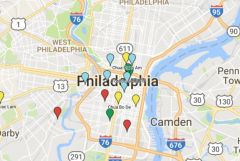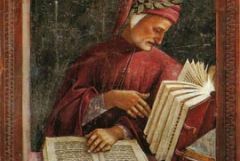Digital Humanities
One of the most significant outcomes of Humanities Writ Large is an impressive array of Digital Humanities projects. Some were integral to the work of Emerging Networks. Others were created by Visiting Faculty Fellows, either during their residency at Duke or after returning to their home institution armed with fresh knowledge and inspiration. In some cases, fellows with no plans to engage in a Digital Humanities project were inspired to do so by their HWL experience. The Digital Humanities projects listed below are a powerful reflection of the cross-fertilization of ideas that emerges when scholars from diverse disciplines gather together.
Projects
|
Using Digital Humanities skills he developed as a Visiting Faculty Fellow, Norman Sandridge helped to create a collaborative online syllabus for a course on leadership in the ancient world. Produced under the auspices of Sunoikisis, a national consortium of Classics programs, the site—Beyond the Boundaries of Fantasia: An Ancient Imagining of the Future of Leadership—is modeled on the concept album and designed with the general audience in mind. Its 15 “tracks” use the literature, history, archaeology, and material culture of the classical world to explore big questions about crises of leadership, leaders and followers, gender and leadership, rhetoric and self-presentation, and more. Read More about Beyond the Boundaries of Fantasia |
|
C. Pierce Salguero used his HWL Visiting Faculty Fellowship to explore the impact of Buddhism—its doctrines, practices, and cultural orientations—on the healthcare landscape of Philadelphia. Since returning from the fellowship, he has organized small teams of undergraduate student researchers to visit targeted locations throughout the Greater Philadelphia. They have conducted interviews with monastics, teachers, and community representatives, and integrated this ethnographic information and audiovisual materials into a Google map that showcases Philadelphia’s Buddhist diversity. Read More about Buddhist Healing in Philadelphia |
|
Mass incarceration is a burgeoning area of scholarship, but because it responds to emerging issues and crosses traditional disciplinary boundaries, it can be challenging to teach. To help the many instructors engaged with the topic, the Emerging Network project Mass Incarceration and the Carceral State developed an online pedagogical hub to store, coordinate, and curate resources for teaching and learning about mass incarceration. The site aims to encourage scholarship and teaching about the carceral state by making it easier to openly share materials, promote good ideas, and acknowledge the contributions of others working in this area. Read More about Carceral Studies Network |
|
One of Norman Sandridge’s projects as an Visiting Faculty Fellow was to work with Duke philosophy professor Joshua Sosin to improve Cyrus’ Paradise, a collaborative online commentary to Xenophon’s Education of Cyrus or Cyropaedia. Cyrus’ Paradise features comments, multimedia, bibliography, and grammatical and syntactical instruction from authorized users. Housed and maintained by Harvard’s Center for Hellenic Studies in Washington, D.C., the site is the product of a creative collaboration between Sandridge, David Carlisle, and Allen Romano, with crucial consultation from many others. Read More about Cyrus’ Paradise |
|
The aim of Dante's Library: Rebuilding a Medieval Network of Knowledge was to reconstruct in virtual form what would have been Dante's library in the broadest sense of the word—the literary, theological, philosophical, political, and scientific texts that he might have read and the artwork he might have encountered. The result was an online collection of the material that shaped Dante's vision. It draws on existing digitizations plus some of its own, and includes brief texts that introduce each work, manuscript, or image and give a sense of its context, its significance, and its connections to Dante. Read More about Dante's Library |
|
Hi-Phi Nation is the first sound and story-driven show about philosophy, weaving philosophy with narrative storytelling, investigative journalism, and sound design. The first season was produced out of Duke University on the Humanities Writ Large Fellowship by Barry Lam. Barry is an alum of UC Irvine and former program director and general manager at KUCI 88.9FM. A PhD in philosophy at Princeton University, Barry is currently Associate Professor of Philosophy at Vassar College. The 10-episode first season is now available for download using any of your podcatchers or at the show's website. Read More about Hi-Phi Nation |
|
During her time as Visiting Faculty Fellow, Meredith Goldsmith created a map of locations referenced in Edith Wharton's novel The Age of Innocence. In order to complete this project, she had to learn a great deal about the tools and techniques of digital mapping. For the benefit of others who would like to pursue similar projects, she created a website, Mapping Literary Visions. The site includes example maps, GIS resources, and a Q&A page. Read More about Mapping Literary Visions |
|
During his 2014-2015 Visiting Faculty Fellowship, Frank Graziano—a scholar of the material culture of religion—finished a book, Miraculous Images and Votive Offerings in Mexico. With the assistance of the indispensable Brian Norberg, of Trinity Technology Services, he turned a collection of photos he’d taken in Mexico into a beautiful companion web site. Read More about Miracles in Mexico |
|
Charles Edward McGuire's main project as a Visiting Faculty Fellow is a book, The British Musical Festival, 1695-1940: A Social History of Taste, that documents the rich history of musical festivals in Great Britain. In the course of that work, he began assembling a database of British musical festivals. The side project soon took on a life of its own. Numerous students were recruited to scour the archives and digitize centuries worth of festival records. A website—Musical Festivals Database—was created to allow users to search this rich historical trove. This is an ongoing project, with updates and news posted on the site. Read More about Musical Festivals Database |
|
This ongoing collaboration between Duke's Center for Documentary Studies, Duke University Libraries, and the SNCC Legacy Project centers on the living memory of members of the Student Nonviolent Coordinating Committee, a leading force in the fight for minority voting rights in the 1960s. The project's main focus is the SNCC Digital Gateway, a documentary website. It uses documentary footage, audio recordings, photographs, and documents to show how SNCC organizers, alongside thousands of local Black residents, worked so that Black people could take control of their lives. The SNCC Digital Gateway—still a work in progress—is an unprecedented window onto past civil rights struggles as well as a valuable tool for anyone interested in social change in all of its present-day forms. Read More about One Person, One Vote |









